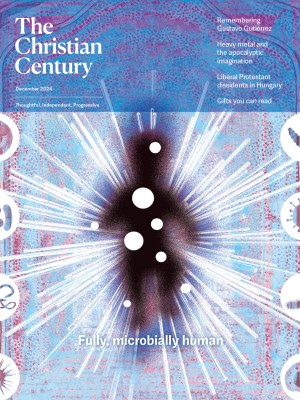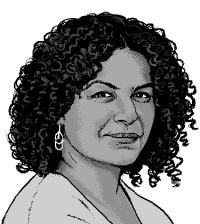Ancestral blessings
I attended a talk by a pastor who begins services by asking, “Who do you bring into worship with you?”

(Century illustration)
Recently I’ve been offered two questions that feel like gifts. The first came from a pastor who gave a talk at a conference I attended. In describing some of his innovative approaches to worship, he said that he opens Sunday services by inviting congregants to name a person or persons they’ve brought into the church with them that morning. As in: Whose spirit is with you today as you enter into worship? To whom are you particularly grateful or indebted? Whose blessing, guidance, provocation, or love accompanies you especially powerfully at this moment?
Some congregants name a beloved and deceased family member: “My grandmother who read me bedtime Bible stories when I was a little boy.” “My husband of 32 years; he had the most gorgeous singing voice.”
Others name writers, activists, theologians, or artists who have inspired them especially powerfully that week: Toni Morrison. Howard Thurman. Mary Oliver. Julian of Norwich. Desmond Tutu.
Still others name biblical characters: Mary Magdalene. Daniel in exile. Hagar, who named God.
The point of the question, the pastor said, is to challenge the extreme individualism that often infiltrates American religion. The harmful and deceptive idea that each of us is a spiritual Lone Ranger, showing up in church on our own strength and by our own initiative, to do Christianity all by ourselves.
Read our latest issue or browse back issues.
The second question, related to the first, came from one of my seminary professors. In the context of inviting us students to reflect more deeply on our vocational paths, she asked, “Which of your ancestors ordained you?” Her point was to remind us that long before we started discerning our own call to ministry, we were inspired, shaped, set apart, recognized, or otherwise “ordained” by the people who came before us. Our commissioning began decades or even centuries before us. We are not self-made for the work of God. We come from others, are shaped by others. We carry others in our spiritual bones.
For me, these two questions feel like invitations from God—invitations to give thanks, to feel held, and to grieve. On the one hand, they assure me that I’m never alone in the life of faith. I am not alone when I show up for worship, even to churches I’ve never been in before. I am not alone in the work of discernment, even when that work feels murky or bewildering. I never have to pull myself up by my own spiritual bootstraps, because I stand in a stream of care, calling, provision, and blessing that long predates me.
On the other hand, the two questions remind me that I have legacies I need to mourn. Messy, imperfect legacies that affect how I approach God, both in worship and in vocational discernment. I am not a blank slate.
At this particular moment in my life, I’m especially aware of the female relatives and ancestors I carry with me. I come from powerful women of faith whose imprints on my life are both consequential and complicated. These are women who proudly trace their Christian lineage back to the first century, when the apostle Thomas brought the story of Jesus to South India. They spent their Sunday mornings sitting cross-legged on straw mats in tiny village churches, trusting God for everything from eternal salvation, to timely monsoons for their family’s crops, to sufficient bowls of rice to fill their children’s bellies.
I come from two grandmothers who woke up at dawn and knelt by their beds every morning to commend each of their children, grandchildren, and great-grandchildren to God. I come from a mother-in-law who was a missionary and a mystic as well as a pastor’s wife, who served thousands of people at her table in Calcutta and experienced Jesus’ presence in ways so palpable, I am full of admiration and envy. I come from a mother—also a preacher’s wife—whose cover-to-cover knowledge of the Bible is as astounding to me as her unwavering, rocklike faith.
I come from all of these remarkable women. These are the women who taught me how to pray, how to worship, how to serve, how to love. Their spirits accompany me to church on Sunday mornings. These are the women who ordained me, who instilled in me the deep and abiding God-hunger that shapes my life. It is their love for Christ and the church that birthed mine. Their examples of servanthood I hope to emulate.
And yet. These are also the women I left behind in my search for a more expansive and progressive Christianity. These are also the women who won’t accept the mainline church I now attend as legitimate. These are also the women whose earnest interpretations of the Bible forbid them from sanctioning the ordination of women in any denomination. The same ancestral convictions that call me also block me.
This is the rub, the pain and fracture that mark my heritage. This is the gap I stand in, between blessing and brokenness.
Who do you bring into worship with you? Which of your ancestors ordained you? To ask these questions, to sit with them in ways that honor their complexity, is to both celebrate and grieve the pasts that made us. It is to reject the myth that we are masters of our own faith, free to plow ahead in worship or in discernment without ever looking back. It is to invite God to work in nuanced ways in our hearts and minds, ways that honor the grayness, the brokenness, the both-ands that form and tether us. Our ancestral callings don’t have to be perfect; God will work with what God is given.
I am grateful to stand in a stream of faithfulness that goes back centuries. My gratitude doesn’t take away from the sadness I feel for what I don’t and can’t have. But neither does the sadness erase the ancestral blessings I benefit from each day. Both are real, and both, in their own sacred ways, are gifts to treasure.






